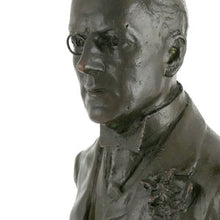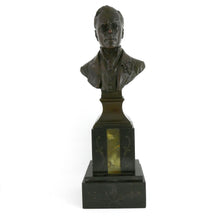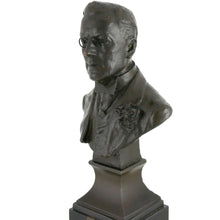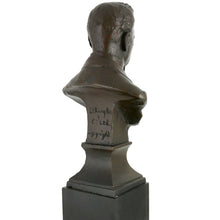Bust of an Imperialist - Colonial Secretary The Rt. Hon. Joseph Chamberlain, 1903
- Regular price
- £865
- Sale price
- £865
- Regular price
-
- Unit price
- /per
Adding product to your cart
Height overall: 30cm (11.8in)
Bronze. Bust of Joseph Chamberlain attired in morning dress with trademark orchid buttonhole and monocle. Indistinctly signed verso, but stylistically attributable to the Birmingham sculptor Courtenay Pollock who produced a well known bronze bust for Elkington & Co., following Chamberlain’s return from South Africa in 1903. The bust signed ‘Elkington & Co. Ltd. / Copyright’. Raised on a stepped onyx and marble base. Height of bronze: 18cm (7in).
Read more
Joseph Chamberlain (1836-1914), was the great exponent of Imperialism, as well as a highly proficient grassroots organiser of democratic instincts, and a key player in winning the Second Anglo-Boer War (1899-1902). He entered business in Birmingham at the age of sixteen at his uncle’s company, which expanded to produce two-thirds of all screws made in England. In 1873 he was elected Mayor of Birmingham, and carried out many reforms. In 1876 he became a radical Liberal M.P. for the city, and was appointed President of the Board of Trade in Gladstone’s Cabinet in 1880. However he split the party being opposed to Irish Home Rule and resigned his office in 1886. In 1895 he became Colonial Secretary in the New Unionist Government. As such he had major responsibility for causing the Second Boer War (1899–1902) in South Africa and was the government minister most responsible for the war effort. He became a dominant figure in the Unionist Government's re-election at the ‘Khaki Election’ in 1900. In 1903, he resigned from the Cabinet to campaign for tariff reform (i.e. taxes on imports as opposed to the existing policy of free trade with no tariffs). In 1902 he bought the Boer War to a successful issue, and in 1903 introduced his New Tariff Reform, but resigned the same year. In 1906 he was laid low by a stroke and was forced from public life.








